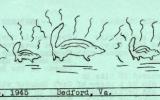CPS Unit Number 121-01
Camp: 121
Unit ID: 1
Operating agency: BSC
Opened: 2 1944
Closed: 6 1946
Workers
Total number of workers who worked in this camp: 402
-
 CPS Camp No. 121The Polecat Press was a newsletter published by the men at Camp 121 from May 1945 to February 1946.Digital image from the American Friends Service Committee: Civilian Public Service Records (DG 002), Swarthmore College Peace Collection, Swarthmore, Pennsylvania
CPS Camp No. 121The Polecat Press was a newsletter published by the men at Camp 121 from May 1945 to February 1946.Digital image from the American Friends Service Committee: Civilian Public Service Records (DG 002), Swarthmore College Peace Collection, Swarthmore, Pennsylvania
CPS Camp No, 121, a National Park Service base camp located near Bedford, Virginia and operated by the Brethren Service Committee, opened in February 1944 and closed in June 1946. The men improved a portion of the Blue Ridge Parkway, fought fires, maintained fire towers and equipment, and built roads and trails.
In south central Virginia in the Blue Ridge Mountains, Bedford lay to the southeast of three peaks. The National Park Service preserved the peaks as part of the Blue Ridge Parkway. The Parkway, stretched from the Great Smoky Mountains in Tennessee to the Shenandoah National Park in Virginia.
Directors: Earl Garver, Robert Sollenberger, Lewis Beckford
Men in Brethren camps and units tended to report diverse religious affiliation when they entered CPS, nearly half of the men in Brethren projects reported affiliation with Brethren groups.
Men in Brethren projects reported considerably more education and professional experience than those who enlisted in the Army and Navy, and brought an average of 12.22 years of education. Twenty-one percent had completed one-three years of college, nine percent had graduated from college and nine percent had completed postgraduate work prior to entering CPS. (Sibley and Jacob p. 171)
More men in both Mennonite and Brethren camps entered CPS from rural areas while men in Friends camps and units tended to enter from urban areas.
Twenty-nine percent of men in Brethren camps reported their occupation as farming or other agricultural work upon entering CPS; eighteen percent reported technical and professional occupations; and sixteen percent business management, sales and public administration occupations when entering CPS. Another twenty-one percent reported skilled and semi-skilled trades. (Sibley and Jacob p. 172)
The men removed dead timber from along the parkway, felling many trees previously killed by blight. After cutting them into manageable lengths, they hauled them away to be sold. They burned the leftover brush during safe periods.
As was the case in all National Park Service camps, the men fought fires, maintained fire equipment and towers, in addition to performing park, road and trail maintenance.
Men often expressed their concern about the menial nature of the work and that their special skills and training were often not utilized in the base camps.
The Brethren camp staff and the men organized education, recreation, religious life and other leisure activities of the camp. A camp council and committees for each of the areas of camp life looked after specific concerns, but matters involving all the men came to the camp meeting for discussion and action. Often assignees served on the staff, and from 1944 on, men also participated in selecting the camp director.
Bedford’s camp library contained between eighteen hundred and two thousand books which the men used to pursue diverse programs of reading and study.
The men published a camp paper The Polecat Press from May 1945 through February 1946.
For information on Brethren base camps and camp life see Leslie Eisan, Pathways of Peace: A History of the Civilian Public Service Program Administered by the Brethren Service Committee. Elgin, IL: Brethren Publishing House, 1948, Chapter 3 Base Camps: The Work Projects and the Camp Organization pp. 73-111; Chapter 4 Base Camps: Camp Life pp. 112-187.
See Kevin Grange, “In Good Conscience”, National Parks (Winter 2011): 26-32. http://www.ncpa.org/magazine/2011/winter/in-good-conscience.html?
For general information on the work and life in CPS camps and units, see Albert N. Keim, The CPS Story: An Illustrated History of Civilian Public Service. Intercourse, PA: Good Books 1990.
See also Mulford Q. Sibley and Philip E. Jacob, Conscription of Conscience: The American State and the Conscientious Objector, 1940-47. Ithaca, NY: Cornell University Press, 1952.
Swarthmore College Peace Collection, Camp periodicals database.
